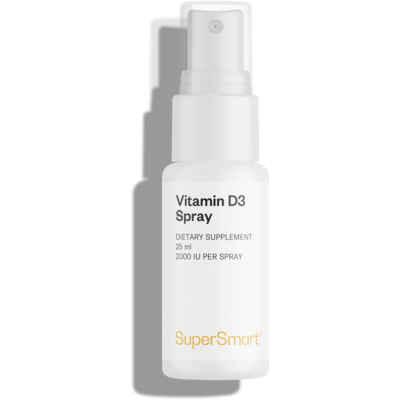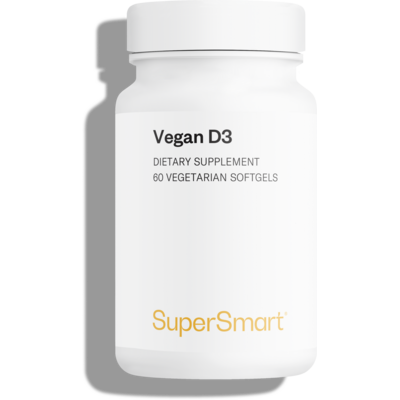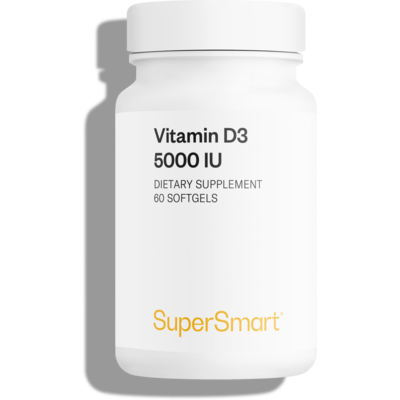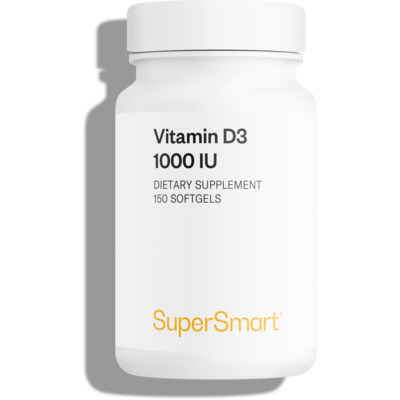Does vitamin D help prevent dementia?
A 35-year study, published in December 2022, analyzed the relationship between vitamin D levels and cognitive decline in older adults. We take a closer look at a discovery that pushes the boundaries in the fight against Alzheimer’s disease.

Vitamin D cognitive function: what we know
While the benefits of vitamin D on bone strength, immunity and general well-being have been well-documented for many years, its effects on the brain have been explored less extensively (1).
However, a 2012 meta-analysis found a correlation between low vitamin D and reduced cognitive function as well as a greater risk of developing Alzheimer’s disease (2).
A 2016 study reached a similar conclusion, stating that “it appears crucial to maintain vitamin D concentrations at sufficiently high levels in order to slow, prevent, or improve neurocognitive decline“ (3).
Most importantly, a new article was published in December 2022 on a long-term study demonstrating the benefits of vitamin D in a population of elderly volunteers (4).
Almost 300 individuals had agreed to undergo yearly tests designed to assess their mental health and cognitive function, over a period that for some, extended to 35 years! All the participants had agreed to donate their brains to science after their death.
This three-decade, large-scale investigation identified an association between higher vitamin D concentrations in all four areas of the brain and a lower risk of developing dementia or cognitive impairment by the time of the participant’s final test before their death.
In other words, the vitamin appears to protect cognitive function in older individuals, and by extension, the population as a whole.
Link between a lack of vitamin D and dementia: mechanisms yet to be established
A number of studies over the last ten years or so have thus demonstrated a correlation between vitamin D levels in the body (or even the brain) and cognitive function and mental health.
A 2013 paper summarised the situation as follows: “Beyond its traditionally-recognized properties of regulating calcium phosphate metabolism, vitamin D is a neurosteroid hormone essential for neurophysiological function (regulation of neurotransmitters and neurotrophins) with an additional anti-inflammatory and antioxidant neuroprotective action” (5).
What’s more, it was found that older people with dementia or Alzheimer’s disease or with decreased cognitive ability, all presented with a deficiency in vitamin D while conversely, those with good cognitive function had adequate vitamin D levels.
As yet, however, the specific mechanism by which vitamin D protects the brain from decline is unknown. Further research is therefore needed to establish exactly how vitamin D acts to protect against dementia and Alzheimer’s disease.
How can you boost your vitamin D levels naturally?
The body obtains vitamin D in two ways: from food, especially oily fish and eggs, and from exposure to the sun. Vitamin D is naturally produced by the body when the skin is exposed to UVB rays.
But as one dermatology study noted (6), “the recommended daily dose of vitamin D for adults (at least 800 IU) cannot be achieved through diet alone”. What’s more, above a certain level of exposure, UV leads to the degradation of vitamin D and its precursors in the skin. In addition, it’s been widely demonstrated that UV radiation is the main external risk factor for skin cancer.
Therefore, in order to obtain a minimum of 800IU of vitamin D a day, and if possible an adequate dose of 2000IU-5000 IU, many doctors follow the example of France’s National Academy of Medicine (7) in recommending routine supplementation with vitamin D for the whole population.
SuperSmart ADVICE
References
- ALI, Nurshad. Role of vitamin D in preventing of COVID-19 infection, progression and severity. Journal of infection and public health, 2020, vol. 13, no 10, p. 1373-1380.
- BALION, Cynthia, GRIFFITH, Lauren E., STRIFLER, Lisa, et al.Vitamin D, cognition, and dementia: a systematic review and meta-analysis. Neurology, 2012, vol. 79, no 13, p. 1397-1405.
- ANNWEILER, Cédric. Vitamin D in dementia prevention. Annals of the New York Academy of Sciences, 2016, vol. 1367, no 1, p. 57-63.
- SHEA, M. Kyla, BARGER, Kathryn, DAWSON‐HUGHES, Bess, et al.Brain vitamin D forms, cognitive decline, and neuropathology in community‐dwelling older adults. Alzheimer's & Dementia, 2022.
- ANNWEILER, Cédric. Les effets neurocognitifs de la vitamine D chez la personne âgée. OCL, 2014, vol. 21, no 3, p. D307.
- BARYSCH, Marjam-Jeanette, FELDMEYER, Laurence, BISCHOFF-FERRARI, Heike, et al.Vitamine D, ultraviolets et cancer de la peau. Revue médicale suisse, 2010, vol. 6, no 246, p. 884-885.
- Rapport de l’Académie nationale de médecine. Statut vitaminique, rôle extra osseux et besoins quotidiens en vitamine D. Bull Acad Natle Med. 2012, 196, 1011.
Keywords
5 Days
great products and prices
great products and prices
Marie
11 Days
Easy to navigate site
Easy to navigate site, had what I was searching for, good price. easy order-check out
James Tucker
17 Days
My skin is clearing up nicely!
Pretty good for my skin so far.
Christian
19 Days
The new packaging is excellent
The new packaging is excellent - finally! No more squashed boxes and torn envelopes.
GORAN
20 Days
Great Product
Great Product
Larry Garrett
24 Days
Quick shipping
Quick shipping; good price. No issues!
Mary McCarty
26 Days
Thr product is very good and is helping…
Thr product is very good and is helping me on my health. Then is always on time
LUGO Luz
28 Days
Buying was fine
Buying was fine. I had problems with the website not recognizing my login info, and had to call to get it fixed. Other than that, everything was good.
David S. Clark
29 Days
Your super maca and super ginseng are…phenomenal
Your super maca and super ginseng are phenomenal supplements that compliment each other when taking them together. Fantastic feeling of well-being and lots of mid day energy without the crash.
Keith Mason
31 Days
I have had amazing results with every…
I have had amazing results with every supplement I've purchased. I am extremely satisfied with this company
kirstin Torres
31 Days
Fine products
Fine products . They are on the leading edge of online supplements. The only issue -so far-is they sometime run out of subscription items.
Jason Argos
34 Days
The ordering process is very user…
The ordering process is very user friendly and the products always come in a timely manner.
CARTER Rhonda
35 Days
The price for Dr
The price for Dr. Pero's AC-11 is reasonable and in line with his views. (my former colleague). Keep it pure.
CAMPBELL Clayton
38 Days
Right on every time.
Right on every time.
Arthur Nicholas
41 Days
They are cheaper than everyone else and…
They are cheaper than everyone else and the shipping was fast. Great company.
Patricia Adams








